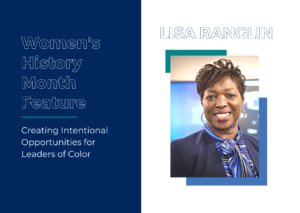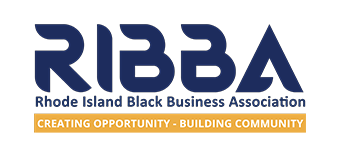Leading with Intention: It Starts from Within

by Stephanie Mireku: RIBBA Content Writer and Emerging Leader
The story of how the face and depth of leadership within Rhode Island is changing is far from just beginning but the pace just intensified. That is because of the work of a few key intentional organizations, a few determined business leaders, a few passionate emerging leaders, a woman on fire for economic and social transformation, and some transformative and impactful alignment through partnership. These elements comprise the powerhouse of people and organizations that made the first cohort of the Rhode Island Black Business Association (RIBBA) Emerging Leaders Development Program (ELDP), a program created by and for professionals of color with the intention of helping prepare and propel dedicated local emerging leaders for the next step in their vocational trajectories. I sat down for a candid conversation and reflection on the program with Lisa Ranglin, MS, PMP, CSSGB, the Founder and President of Rhode Island Black Business Association, upon the completion of this first cohort, and the conversation was just as energetic and vibrant as the program itself.
The controversial and questionable sentiment that there are not enough leaders and emerging leaders of color positioned for growth in the state of Rhode Island has been crushed by the weight of achievement and drive demonstrated by the participants of the program’s inaugural cohort and the impact of their stories is amplified by data. According to the Association of Fundraising Professionals of Rhode Island as quoted by Ruth McCambridge for the Nonprofit Quarterly, as recently as 2020, “even though people of color make up 30 percent of the state’s (Rhode Island) population, only three percent of the chief executive officers of that state’s nonprofits are led by people of color, and only 10 percent of board members are of color”(Nonprofit Quarterly). Lisa Ranglin specifically addressed this issue when she spoke about the program and described what it means to her, sharing that the impact is in the output, which is 25 leaders of color who have all successfully emerged from the program inspired, prepared, confident and motivated to not only excel and take their space but also uplift others and pay it forward for future generations of leaders to come.
The journey to this program for Lisa began in 2016 when she was blatantly overlooked for an opportunity that she was an ideal and well positioned candidate for. She flipped this negative experience into a launching pad for her own opportunity and as a platform to create space for other Black leaders and leaders of color by trailblazing the challenging yet critical path toward what is now the RIBBA Emerging Leaders Development Program. While she was declined funding, partnership, and support opportunities for this program, she persisted in pursuing her vision and ultimately sought and gained resounding key and foundational support from the Women’s Fund of Rhode Island for a proofing concept, a partnership from the University of Rhode Island, and funding from the Department of Labor and Training, among other enthusiastic partners and supporters. It is clear that this investment will go a long way in creating and sustaining opportunities for leaders of color. According to McKinsey and Company, organizations in the top quartile for ethnic and cultural diversity on executive teams were 33% more likely to have industry leading profitability in 2017 (McKinsey & Company). Lisa spoke to the value and impact of creating these intentional opportunities for leaders of color like the inaugural ELDP cohort participants, which starts with increases in earning potential, access to sponsors and mentors, career mobility and translates into increased opportunity and access for families, organizations, and communities, which in turn improves the quality of life for everyone involved. When Black people, and in particular, Black women and girls are at the center of efforts to advance equity and opportunity, it in turn fuels progress for organizations and communities as a whole, Lisa shared. This is supported by research too: “Black women account for only 1.6 percent of vice presidents and 1.4 percent of C-suite executives, while white men hold 57 percent and 68 percent of those position (McKinsey & Company’s The State of Black Women in Corporate America 2020). When looking at what is referred to as the “invisibility” of Black women, Psychology Today stated that, “Because of their multiple subordinate-group identify, Black women live in the intersection between these two stereotyped groups, and as a result, often fall between the cracks. So not only do Black women have to overcome the disadvantage of being a member of two underrepresented groups, they also have to deal with another form of discrimination that is not shared by White women or Black men: Invisibility. This means their presence is more likely to go unnoticed and their voice ore likely unheard. To stand out and voice their opinions Black women have to work even harder than their fellow Black men or White women counterparts.” (Psychology Today).
The most significant evidence of the efficacy and power of this program is in the outcomes: 100% graduation as well as several cases of promotions, salary increases, job offers, and access to executives, new professional relationships and opportunities, and key pathways to important decision making conversations. The participants of the program not only are doing well for themselves extrinsically but also intrinsically with meaningful new bonds with fellow participants and program partners and supporters, deeper understanding of personal growth opportunities, and a sense of accomplishment, empowerment, and excitement.
Many are asking the question of what’s next for ELDP and RIBBA, and to that Lisa and Amanda Román share with excitement and vigor that the next round of applications for the leadership program will open in May 2022 for a program kickoff in October 2022, and those who are enthusiastic about supporting the work that RIBBA is doing can reach out to Amanda for details about how to get connected and involved, or sign up for the newsletter. Additionally, RIBBA would like to take this model of development on the road to organizations seeking similar opportunities that are serious about creating and expanding economic opportunity. What happens to the recently graduated cohort, is another important question, to which the answer is: in board rooms, at press conferences, running businesses, evaluating the best places to leverage their skills and talents, in leadership conversations and strategy sessions, changing the face of Rhode Island, and supporting and uplifting each other and so many others who need the encouragement, support, and advocacy.
How do people change the power structure and leadership pipeline of a small but mighty state whose systems of power and structures of leadership don’t accurately or sufficiently represent its constituents? You start by influencing the networks of impact by practicing intentional leadership, partnering with aligned and resourced entities, following up with well thought out and sustained action steps, and celebrate progress with the people who you come to admire and respect through the process because you all took an important and impactful chance, together, to change the world one step at a time.
For more information or questions, please reach out to amanda@ri-bba.org.
